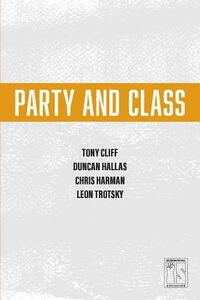Take a photo of a barcode or cover
challenging
informative
A collection of 6 essays, it's about the differences between a socialist or socialist influenced party & that of a socialist & working class as a whole & how they should function in society in a manner that will give the working class the best possible chance at liberation.
The spectre of Stalinism is always near when it comes to criticism & opposition of socialism, so there is a bit of time explaining the difference between the two & why the criticism ultimately ignore the historical conditions that led to the rise of Stalinism.
While the party & class are ultimately two different things, at least in the beginning stages, the two may need to function & coexist together if there is to be any hope of change. It is not to be a top down approach, with the party being some separate or elitist group, rather the party is to be informed by the class. The fact that the class as a whole is not a monolith must be taken into account & the various ways each group within the working class is oppressed & the unique conditions in which they are faced must be taken into account, the party must be brought up to speed & agreement on how best to eradicate these issues & keep the party working toward the ultimate goal of freeing society from class oppression is imperative.
It is made clear the importance of the party not having discussions of or about goals, action, disagreements etc without the masses. The opposite of what is done in modern society, where a minority discusses what is to be done (to their own benefit) behind closed doors. Everything should be discussed in the open in order to be informed & built from the bottom up & move forward accordingly.
Trotsky's essay, through criticizing a popular paper at the time for it's ignorance in criticizing the workers during the Spanish Civil War & the Russian Revolution without taking class & historical factors into account, stresses the importance of the party in the beginning stages & up through the revolution as well as the importance of class analysis in any critique of movements overall & their shortcomings.
Caution is given against sectarianism as well as a clear explanation of what it is & what it isn't. The goal is to support workers & spur action, not strive for party purity or discussion for it's own sake.
The overall theme of the essays is the importance of the workers to the movement, even if not fully aware of all the ins & outs of socialism & how they are exploited by capital. It is enough for them to be aware that something is wrong, the party can help further inform them & they must come before the party. A short & great read!
The spectre of Stalinism is always near when it comes to criticism & opposition of socialism, so there is a bit of time explaining the difference between the two & why the criticism ultimately ignore the historical conditions that led to the rise of Stalinism.
While the party & class are ultimately two different things, at least in the beginning stages, the two may need to function & coexist together if there is to be any hope of change. It is not to be a top down approach, with the party being some separate or elitist group, rather the party is to be informed by the class. The fact that the class as a whole is not a monolith must be taken into account & the various ways each group within the working class is oppressed & the unique conditions in which they are faced must be taken into account, the party must be brought up to speed & agreement on how best to eradicate these issues & keep the party working toward the ultimate goal of freeing society from class oppression is imperative.
It is made clear the importance of the party not having discussions of or about goals, action, disagreements etc without the masses. The opposite of what is done in modern society, where a minority discusses what is to be done (to their own benefit) behind closed doors. Everything should be discussed in the open in order to be informed & built from the bottom up & move forward accordingly.
Trotsky's essay, through criticizing a popular paper at the time for it's ignorance in criticizing the workers during the Spanish Civil War & the Russian Revolution without taking class & historical factors into account, stresses the importance of the party in the beginning stages & up through the revolution as well as the importance of class analysis in any critique of movements overall & their shortcomings.
Caution is given against sectarianism as well as a clear explanation of what it is & what it isn't. The goal is to support workers & spur action, not strive for party purity or discussion for it's own sake.
The overall theme of the essays is the importance of the workers to the movement, even if not fully aware of all the ins & outs of socialism & how they are exploited by capital. It is enough for them to be aware that something is wrong, the party can help further inform them & they must come before the party. A short & great read!
A lot of the period writing and foreign politics jargon can be hard to follow, but of what I gathered from it was good. If you're able to apply some of its views for today and where you live, it can be quite worthwhile.
Found this book very useful to understand the current hecticness within DSA as it crosses the 100,000 member threshold. The Left seems to have an intergenerational problem of how to maintain the course once power is gained. For every day use, it drove home how the written material of socialism is meant to be a grounding as we go through our lives, most importantly our jobs, and make every effort we can to center the working class. Quick read that I highly recommend for any leftist or progressive.

